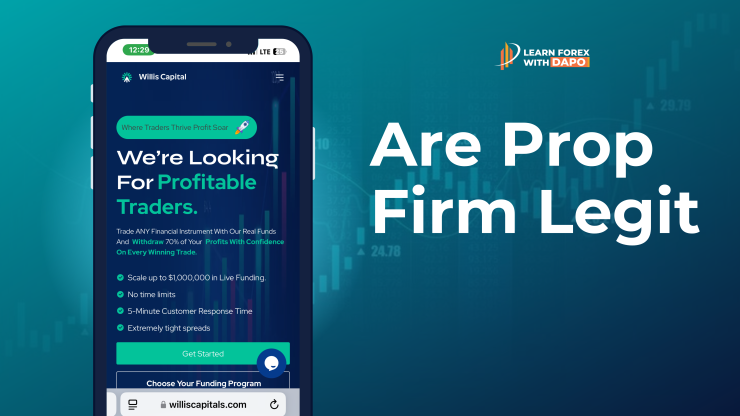Proprietary trading firms, popularly known as prop firms, are known for their ease of application. Anyone can apply to become a prop trader.
This ease is because of the fewer regulations that proprietary trading firms face, however, this ease is also what makes it very easy for fake prop firms to pop up and make away with wanna-be prop traders’ money.
Now this might come as a shock because what makes proprietary trading firms different from retail trading is the fact that the company is the one who provides the money to be traded, and then the profit is split between the trader and the company.
However, fake proprietary trading firms exist!
They also succeed in rubbing people off their money. What fake proprietary firms are, how they manage to rob people of their money and how to spot and know if a prop firm is legit, will be discussed in detail in this article.
Key Takeaways
- Fake prop firms exploit this ease by making false promises and demanding deposits.
- Legitimate prop firms evaluate traders and provide funds for trading, sharing profits.
- Fake prop firms lure traders with promises of high returns and minimal risk.
- They deceive traders through demands for training fees, technology access payments, and account maintenance fees.
What Are Fake Proprietary Trading Firms?
To be able to know what fake proprietary trading firms are, we need to know what the real ones are and what they do.
Proprietary trading firms are financial institutions that test and gauge traders, picking the best through a series of trading evaluations, and, if they pass provide, said traders with funds to trade with conditions, splitting profits that come from the trade.
It’s a win-win situation where institutions make a profit on their money through professional traders whom they don’t pay until the traders are profitable, and professional traders without money to trade get large amounts of money, which they can use to trade and make money.
Fake proprietary trading firms are not distinguishable from this at first glance.
They promise the same thing, even with higher return percentages for the trader.
They prey on the desire for easy money and downplay their evaluation process, to get more applicants, while also reducing any limitations that would reduce their numbers, even when those limitations are what makes a normal proprietary trading firm efficient and profitable.
How Do Fake Proprietary Trading Firms Rob People Of Their Money?
Ideally, the proprietary trading firm provides the money that traders use for trading, so how do fake proprietary trading firms rob people of their money?
As earlier mentioned, these fake prop trading firms attract traders by promises of high gain and little or no risk, and when they are hooked, certain demands are made for deposits, such as:
1) Training fees:
One illegal way fake proprietary trading firms get money from unsuspecting wanna-be traders is by demanding a little deposit to pay for the awesome training that is promised to go through.
2) Technology access:
Other fake prop trading firms demand payment to access their trading platform and technology, and when you are promised that you are going to gain much more returns on this “premium” technology, most people will jump on it.
3) Account Maintenance:
Another way, fake prop trading firms make money off unsuspecting wanna-be traders is through fabricating fees for managing your account with the platform.
You would notice that while another way fake proprietary trading firms make money from wannabe traders, a major one in fact, which is the requirement for payment to undergo the evaluation process is not listed.
This is because almost all proprietary trading firms request this from people who want to become traders on their platform, as a security precaution, and while the legit prop firms, return part or the full payment back or even when they don’t, do not do anything to sabotage the traders’ trading, while fake prop firms either close up, locking the trader out or sabotage the trading so they can keep the money with the profit the trader has made.
7 Ways To Know If A Prop Firm Is Legit.
You will now realise that to spot a legit prop trading firm from a fake isn’t going to be so simple, however here are seven ways you can cross-check to know if a prop firm is legit.
1) Transparency:
A legitimate proprietary trading firm is very transparent about its operations. That means its charges, if any, terms and conditions, payment arrangements, trading strategies etc. This way you can know how the prop trading firm makes money.
2) Regulations and Compliance:
If the proprietary trading firm is legit and transparent, it would share information about the financial authorities it is regulated and registered. It would give all this information on its website.
Regulatory bodies provide directory and enforcement of rules that protect traders’ interests. A legit prop trading firm would confirm with all the necessary financial regulations.
3) Customer’s Service:
Legit prop trading firms have easily accessible, quick-response customer service. You should be able to contact them, either through email, live chat on the website, or even through calls.
If you cannot contact them or there is a very delayed response, this is a very big red flag.
4) Clear Trading Terms and Conditions:
The goal of any legit proprietary trading firm is to create a win-win situation, and this is very evident in the terms and conditions. There is a give and take.
However, any proprietary trading firm that either has clauses that put the trader at a huge disadvantage, or sounds too good to be true, then it probably is.
Be wary of any unclear terms as fraudulent companies usually use fine print in their contracts to exonerate themselves from legal issues.
5) Educational Materials and Training Support:
Legit proprietary trading firms offer support to their traders through comprehensive educational materials and training. Most times for free. So you want to be looking for a sign that the proprietary trading firm has your success and goodwill at heart.
6) Capital:
Legitimate proprietary trading firms would never request unreasonable amounts of money to get you started on trading on their platform. While most would ask, they are all within reasonable amounts, and some would even return part or the whole money when you pass their evaluation process.
Be very cautious when you get asked for a large sum upfront.
7) Reviews and Reputation:
Finally, pay huge attention to what other people are saying about the proprietary trading firm. Check online forums, reviews or even testimonials from other people who have or are working with the prop firm.
Due diligence is the name of the game when picking a legitimate proprietary trading firm. It takes focus and research. You are about to make a financial decision so take care. If it sounds too good to be true, it probably is.


